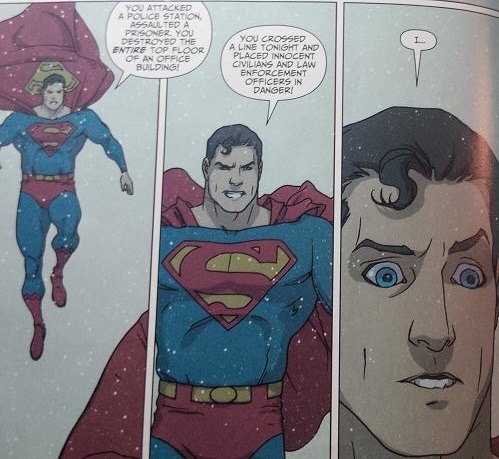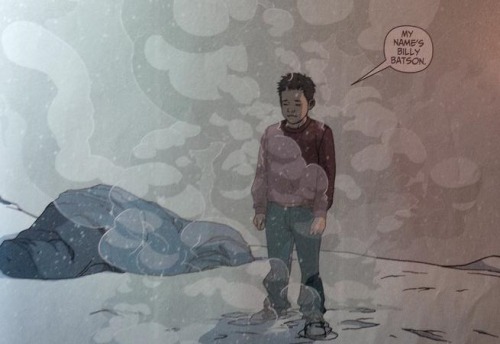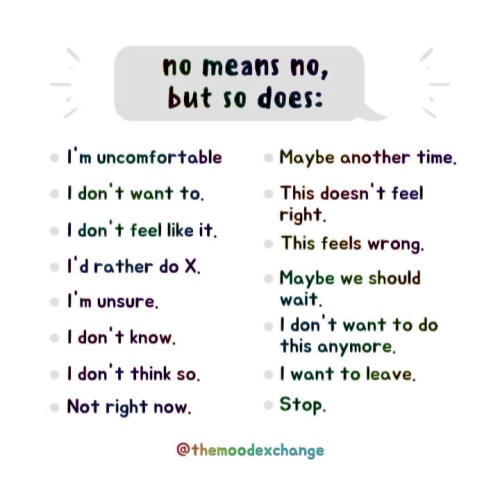Twistybat - Twistybat

More Posts from Twistybat and Others






Oh Billy, you look so small right there…
D'awwww!!!


Naptime (㇏^. ᵥᵥ .^ノ)
After being raised in abuse, it can take a long time to even notice that you’re uncomfortable with a situation you’re in.
I remember for the first time, acknowledging that certain situations made me feel awful, and I wasn’t comfortable taking part in them anymore, only after I escaped. When you’re abused, you’re trapped in a state of almost constant discomfort. To the point where you don’t even notice, don’t even try to fight it, the discomfort is just something you ignore almost instinctively, because you’re so used to not being able to do anything about it. You’re threatened and cornered into having no other option. So accepting everything and anything you feel uncomfortable about, even after escaping abuse, can be almost natural, you don’t even think about it as something avoidable, something you can opt out of.
It takes time to realize that the discomfort is not there to push aside and endure and avoid. It takes time to realize that you have options. That you’re not forced to socialize, to be in a place that stresses the hell out of you, that you don’t have to please whoever wants you to be there, that you can leave, or refuse to even come there in the first place. That you won’t lose anything, or be punished or miss opportunities, if you refuse to endure discomfort. That uncomfortable situations are not ‘mandatory to learn and grow’, they’re places your body doesn’t want to be, and shouldn’t have to be forced into. You’re allowed to strive for comfort. You’re allowed to only put yourself in situations that you really want to be in.


Be you but remember 👆
How to Ride a Werewolf






Now remember, a lady rides sidesaddle, NOT astride. Your mother would be in hysterics at the very idea that a daughter of hers would ride a werewolf astride! Why, next you’ll be showing ankle…
when you go from a bad situation into a better one you may collapse exhausted and unsure what to do and full of grief, you may need time to regain the ability to do things as yourself or motivated by anything other than terror, you may need time to process or mourn or fall apart in ways you could not before,
and people may use this as proof that the old situation was better for you, proof that you need to go back, and it is not proof that it was better for you or proof that you need to go back
It is incredibly important to train yourself to have your first instinct be to look something up.
Don't know how to do something? Look it up.
See a piece of news mentioned on social media? Look it up.
Not sure if something is making it to the broader public consciousness, either because you don't see it much or you see people saying nobody is talking about it? Look it up.
Don't know what a word means? Look it up.
It will make you a better reader and a better writer, but it will also just make you more equipped to cope with the world.
So often, I see people talking about something as though it is the first time anyone has ever acknowledged it, when I've been reading reports about it on the news for months or years. Or I see someone totally misinterpreting an argument because they clearly don't know what a word means--or, on the other hand, making an argument that doesn't make sense because they aren't using words the right way.
Look things up! Check the news (the real news, not random people on social media)! Do your research! You (and the world) will be better for it.
Every single time abuse victims gather the courage to speak about their abuse, they’re not doing something simple and easy for them. They’re going against everything they’ve been conditioned and groomed into.
Every abused person has been forced by their abuser into some form of secrecy; maybe they promised, or they swore they wouldn’t tell, or maybe they were intimidated, threatened into silence, or the worst one, blamed and forced to acknowledge the abuse is their fault, making it so much more terrifying to tell someone, because telling then becomes an admission of their own guilt. And abuse universally makes victims feel ashamed. Because to admit they were powerless and cornered and dehumanized, it risks so much ostracizing and judging by others who do not want to acknowledge it’s possible to be in such a situation and to be able to do nothing about it. People will prefer to turn their back to victims, than to accept it can happen to anyone, even them, and that nothing they do could possibly prevent it.
Sometimes, the abuse will be too horrible to talk about, or to even think about. Sometimes, mere thoughts of it force a person into a panic attack, or a fight-or-flight mode. Some trauma can make us black out. Sometimes just thinking about it is unbearable and makes us wish we weren’t alive for it.
To go against all of that, and to trust someone to listen, acknowledge it, take us seriously, and sides with us, it’s a huge risk. We risk every single retribution from the abuser, we risk our own emotional and mental state, we risk venturing into the unknown territory of having someone else know our most painful, shameful and vulnerable moments, it’s a risk not everyone can make.
For a person to side against us, after we’ve done all this work in order to be able to speak, is devastating. For someone to call us liars, to accuse us of ulterior motives, of making it up to hurt the abuser, of wanting attention, of burdening them with this, it’s almost unbearable punishment for speaking out. Even worse, siding with abuser and agreeing they had the right to do this, or that it is our fault, it’s the worst possible scenario. It inflicts incredible damage on our lives. Makes it impossible to speak out again. It’s often a risk of speaking out in horrible desperation, only to be silenced forever.
And sometimes, it doesn’t even matter if we want to speak out, because there’s nobody who could help us. Our friends, acquaintances, peers, authorities, we can tell they will do nothing even if they knew. We can tell they will easily side with the abusers, because we heard them supporting the same rhetoric abusers use to justify themselves. Even if they felt sorry for us, we can tell they’re not going to do anything to help. For some, the knowledge of the abuse would only be a burden we don’t want to inflict.
You are not at fault for staying silent. You are not responsible or guilty of a sin if you never told anyone. You are not responsible for the abuser’s actions. You are not responsible for anything. Chances to speak out were either denied or ridiculously risky and/or hopeless to grant you rescue. Even if you stayed silent because your abuser lied and threatened you, you had no way to know for sure. You couldn’t have risked what little safety you had for the possibility of being hurt even worse. You’ve walked with this on your shoulders for so long, you should get to put it down without risking a thing.

Newest batch of Man-Bat serum wasn't potent enough and Kirk doesn't transform all the way
Inspired by the way @inkdrawndreamer draws Kirk (I just wanted to draw him with those pointy ears tooo!!)
-
 blogchaoticstudentpenguinlove liked this · 2 months ago
blogchaoticstudentpenguinlove liked this · 2 months ago -
 gearedhedonist liked this · 1 year ago
gearedhedonist liked this · 1 year ago -
 snorlaxation-novagroove reblogged this · 1 year ago
snorlaxation-novagroove reblogged this · 1 year ago -
 layhereandmeltwithme liked this · 2 years ago
layhereandmeltwithme liked this · 2 years ago -
 scout273021 reblogged this · 2 years ago
scout273021 reblogged this · 2 years ago -
 scout273021 liked this · 2 years ago
scout273021 liked this · 2 years ago -
 aethelfred liked this · 2 years ago
aethelfred liked this · 2 years ago -
 steve-of-the-woods reblogged this · 2 years ago
steve-of-the-woods reblogged this · 2 years ago -
 blueeyeswifedragon liked this · 2 years ago
blueeyeswifedragon liked this · 2 years ago -
 halloweenscorpio reblogged this · 2 years ago
halloweenscorpio reblogged this · 2 years ago -
 halloweenscorpio liked this · 2 years ago
halloweenscorpio liked this · 2 years ago -
 fairlysimplee liked this · 2 years ago
fairlysimplee liked this · 2 years ago -
 killing-time-w-kaz liked this · 2 years ago
killing-time-w-kaz liked this · 2 years ago -
 lovemstud-blog liked this · 2 years ago
lovemstud-blog liked this · 2 years ago -
 apollomoonfire reblogged this · 2 years ago
apollomoonfire reblogged this · 2 years ago -
 apollomoonfire liked this · 2 years ago
apollomoonfire liked this · 2 years ago -
 mikelcity liked this · 2 years ago
mikelcity liked this · 2 years ago -
 cqmonju liked this · 2 years ago
cqmonju liked this · 2 years ago -
 paulgrooms liked this · 2 years ago
paulgrooms liked this · 2 years ago -
 little-philosopher liked this · 2 years ago
little-philosopher liked this · 2 years ago -
 heathgallerysandiego liked this · 2 years ago
heathgallerysandiego liked this · 2 years ago -
 prickalee reblogged this · 2 years ago
prickalee reblogged this · 2 years ago -
 picassoutine reblogged this · 2 years ago
picassoutine reblogged this · 2 years ago -
 anotherdayanothername liked this · 2 years ago
anotherdayanothername liked this · 2 years ago -
 i-am-sammy reblogged this · 2 years ago
i-am-sammy reblogged this · 2 years ago -
 i-am-sammy liked this · 2 years ago
i-am-sammy liked this · 2 years ago -
 craigswanson liked this · 2 years ago
craigswanson liked this · 2 years ago -
 prairiestylebaking liked this · 2 years ago
prairiestylebaking liked this · 2 years ago -
 wanderinggreyzombiegaze liked this · 2 years ago
wanderinggreyzombiegaze liked this · 2 years ago -
 edbuziak liked this · 3 years ago
edbuziak liked this · 3 years ago -
 l-m-iglesia liked this · 3 years ago
l-m-iglesia liked this · 3 years ago -
 miss-arsenic liked this · 3 years ago
miss-arsenic liked this · 3 years ago -
 workman reblogged this · 3 years ago
workman reblogged this · 3 years ago -
 workman liked this · 3 years ago
workman liked this · 3 years ago -
 pebbleinthepond liked this · 3 years ago
pebbleinthepond liked this · 3 years ago -
 princess-snickers reblogged this · 3 years ago
princess-snickers reblogged this · 3 years ago -
 frogbook liked this · 3 years ago
frogbook liked this · 3 years ago -
 sleepyleftistdemon reblogged this · 3 years ago
sleepyleftistdemon reblogged this · 3 years ago -
 queentortoisetrashcan liked this · 3 years ago
queentortoisetrashcan liked this · 3 years ago -
 pashleyashley reblogged this · 3 years ago
pashleyashley reblogged this · 3 years ago -
 pashleyashley liked this · 3 years ago
pashleyashley liked this · 3 years ago -
 sflexlutherx liked this · 3 years ago
sflexlutherx liked this · 3 years ago -
 masohotlthrsm reblogged this · 3 years ago
masohotlthrsm reblogged this · 3 years ago
